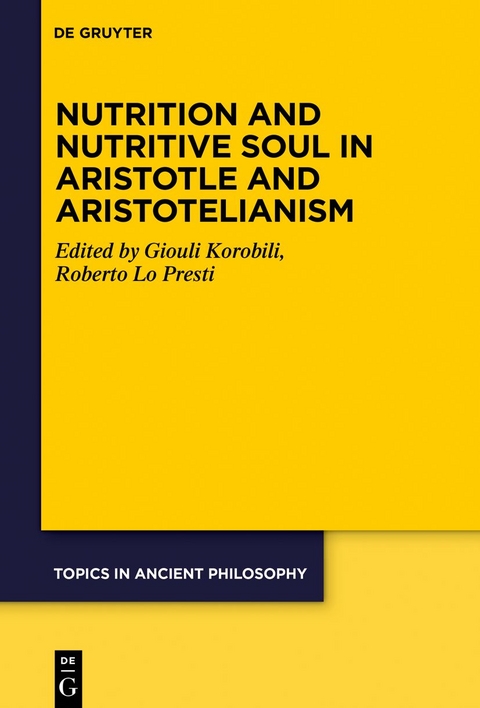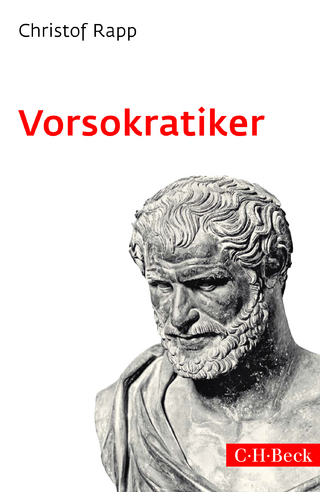
Nutrition and Nutritive Soul in Aristotle and Aristotelianism
Seiten
2022
De Gruyter (Verlag)
978-3-11-110407-2 (ISBN)
De Gruyter (Verlag)
978-3-11-110407-2 (ISBN)
This series provides a forum for monographs and collected volumes aiming at a philosophical discussion of the texts, topics, and arguments of ancient philosophers. The authors demonstrate that philosophical historiography not only paraphrases the claims of ancient authors, but can also reconstruct the arguments for those claims and consider ongoing discussions in modern philosophy, thus enriching the philosophical debate of our time.
This volume is a detailed study of the concept of the nutritive capacity of the soul and its actual manifestation in living bodies (plants, animals, humans) in Aristotle and Aristotelianism. Aristotle’s innovative analysis of the nutritive faculty has laid the intellectual foundation for the increasing appreciation of nutrition as a prerequisite for the maintenance of life and health that can be observed in the history of Greek thought. According to Aristotle, apart from nutrition, the nutritive part of the soul is also responsible for or interacts with many other bodily functions or mechanisms, such as digestion, growth, reproduction, sleep, and the innate heat. After Aristotle, these concepts were used and further developed by a great number of Peripatetic philosophers, commentators on Aristotle and Arabic thinkers until early modern times. This volume is the first of its kind to provide an in-depth survey of the development of this rather philosophical concept from Aristotle to early modern thinkers. It is of key interest to scholars working on classical, medieval and early modern psycho-physiological accounts of living things, historians and philosophers of science, biologists with interests in the history of science, and, generally, students of the history of philosophy and science.
This volume is a detailed study of the concept of the nutritive capacity of the soul and its actual manifestation in living bodies (plants, animals, humans) in Aristotle and Aristotelianism. Aristotle’s innovative analysis of the nutritive faculty has laid the intellectual foundation for the increasing appreciation of nutrition as a prerequisite for the maintenance of life and health that can be observed in the history of Greek thought. According to Aristotle, apart from nutrition, the nutritive part of the soul is also responsible for or interacts with many other bodily functions or mechanisms, such as digestion, growth, reproduction, sleep, and the innate heat. After Aristotle, these concepts were used and further developed by a great number of Peripatetic philosophers, commentators on Aristotle and Arabic thinkers until early modern times. This volume is the first of its kind to provide an in-depth survey of the development of this rather philosophical concept from Aristotle to early modern thinkers. It is of key interest to scholars working on classical, medieval and early modern psycho-physiological accounts of living things, historians and philosophers of science, biologists with interests in the history of science, and, generally, students of the history of philosophy and science.
lt;strong>Giouli Korobili and Roberto Lo Presti, Humboldt University of Berlin, Germany.
| Erscheinungsdatum | 20.11.2022 |
|---|---|
| Reihe/Serie | Topics in Ancient Philosophy / Themen der antiken Philosophie ; 9 |
| Co-Autor | Dorothea Keller |
| Verlagsort | Berlin/Boston |
| Sprache | englisch |
| Maße | 153 x 230 mm |
| Gewicht | 801 g |
| Themenwelt | Geisteswissenschaften ► Philosophie ► Philosophie Altertum / Antike |
| Schlagworte | Aristoteles • Aristotelianism • Aristotle • Ernährung • Nutrition • Pneuma • Seele • Soul |
| ISBN-10 | 3-11-110407-9 / 3111104079 |
| ISBN-13 | 978-3-11-110407-2 / 9783111104072 |
| Zustand | Neuware |
| Informationen gemäß Produktsicherheitsverordnung (GPSR) | |
| Haben Sie eine Frage zum Produkt? |
Mehr entdecken
aus dem Bereich
aus dem Bereich
mit Sokrates, Seneca, Platon & Co. im Gespräch
Buch | Hardcover (2023)
FinanzBuch Verlag
18,00 €


